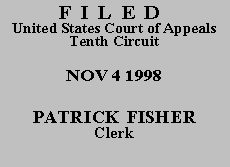

| CARLTON ALLEN,
Plaintiff-Appellant, v. BOARD OF EDUCATION, UNIFIED SCHOOL DISTRICT 436; JACKIE FREISBERG, JOYE NUNNELEY, TIM RIGDON, REX BARRETT, TIM CARSON and HAROLD L. HOWARD, individually and in their official capacity, Defendants-Appellees. |
|
Plaintiff Carlton Allen appeals from the district court's grant of summary judgment to defendants on his age discrimination claim, filed pursuant to the Age Discrimination in Employment Act (ADEA).(1) Plaintiff, formerly a high school principal, alleged that defendants, a school board and its members, violated the ADEA when they voted not to renew his employment contract for the 1993-1994 school year. The district court assumed that plaintiff had made out a prima case, "albeit an extremely weak one," under the burden-shifting analysis set out in McDonnell Douglas Corp. v. Green, 411 U.S. 792, 802-04 (1973). See Appellant's App., Vol. I, at 54. However, the court determined that the ADEA claim should be dismissed. It concluded that defendants had presented legitimate, nondiscriminatory reasons for their action, and that plaintiff's evidence did not demonstrate a triable issue on pretext under the burden-shifting analysis. The court also concluded that plaintiff had not presented direct evidence of age discrimination. See id.
On appeal, plaintiff presents and discusses evidence supporting various arguments which were not before the district court on summary judgment. As a general rule, we will not consider arguments not raised below. See Walker v. Mather (In re Walker), 959 F.2d 894, 896 (10th Cir. 1992). Plaintiff also contends that the district court looked at evidence not relied upon by the school board in making its decision, and that the court applied incorrect legal standards to his case, requiring him to come forward with direct evidence of age discrimination. See Greene v. Safeway Stores, Inc., 98 F.3d 554, 557, 559 (10th Cir. 1996) (plaintiff may challenge employment action by using prima facie scheme or by presenting direct evidence of discrimination). Our review of the district court's decision convinces us that these arguments lack merit. For substantially the reasons set forth in the district court's Memorandum and Order dated June 25, 1997, the judgment of the United States District Court for the District of Kansas is AFFIRMED.
Entered for the Court
Circuit Judge
*. This order and judgment is not binding precedent, except under the doctrines of law of the case, res judicata, and collateral estoppel. The court generally disfavors the citation of orders and judgments; nevertheless, an order and judgment may be cited under the terms and conditions of 10th Cir. R. 36.3.
1. Plaintiff also asserted claims under 42 U.S.C. §§ 1983 and 1985, and state law. The district court dismissed these claims, as well as several original defendants, following Plaintiff's stipulation. See Appellant's App., Vol. I, at 40.